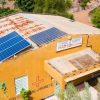Solar professionals made in Zambia

Local farmer Hamwaata Halwiindi’s journey in the renewable energy sector raises hopes for change and an energy transition on the African continent, even in the remotest regions. With a degree in the Zambia College of Agriculture’s solar programme and hands-on experience at Saro Agro, he can now take a greener future for his country in his own hands.
From the field to the panel
In the heart of Monze, Zambia, a young farmer named Hamwaata Halwiindi is steadily working towards his vision of a cleaner future for his country. Hamwaata was one of many graduates with flying colours from the solar course at the Zambia College of Africulture, supported by the Green People’s Energy programme of Deutsche Gesellschaft für Internationale Zusammenarbeit (GIZ). Afterwards, his curiosity further led him to a two-week internship at Saro Agro, a company specialising in the supply of agricultural machinery and equipment. Equipped with valuable knowledge and newly developed skills in the field of renewable energy, the difference he can now make in his business and community is that he can install, maintain and even repair solar equipment for productive use on his farm, and others.
Solar technology for productivity in remote areas
Use of solar-powered appliances can help farmers like Hamwaata increase productivity and improve economic development in communities. For example, solar water pumps can potentially increase the annual income of farmers by 50% or more, in comparison to rainfed irrigation. Solar powered irrigation also makes harvests more reliable and independent of rainfall. However, skills come rare outside cities, and the ability to install, maintain and repair equipment can determine how successful and sustainable equipment can be in its use.
Empowering decentralised energy access through decentralised skillsets
Hamwaata’s decision to attend the solar course was born out of a desire to overcome the challenges he encountered working with solar technology on his farm. Previously, he had to depend on outside help for even the smallest errors, but the solar course offered him the opportunity to empower himself with knowledge. “I chose this course because I used to find working with solar difficult. Even with a small fault, I had to call someone to come from Lusaka around 200 kilometres away and 4 hours by car .” For decentralised energy to work, knowledge and expertise are required locally. Green People’s Energy helps run short courses aimed at local professionals and students with little or no experience to provide them with practical skills to better plan, finance, implement and maintain off-grid, decentralised renewable energy, and also to offer them a way out of energy poverty and into energy security.
Local skills for local capacities
After the training, Hamwaata is now able to install solar panels without the help of engineers from the Zambian capital. “When I heard there was an opening for the solar course, I decided to come so that I could acquire knowledge and do things on my own,” Hamwaata explains enthusiastically. His vision goes beyond personal gain, as he sees the potential of this knowledge to change lives and alleviate poverty. “First, I will use the knowledge I acquired, in my home, but not just here. I will go anywhere else and help people in my community”. During his internship at Saro Agro, Hamwaata acquired important skills to install solar-powered security lights and assemble solar products and inverters. The highlight of his internship was the installation of a complex solar system consisting of solar panels, inverters, and batteries. He is grateful for the advanced knowledge he gained from this internship and plans to use this knowledge to power his household appliances with solar energy and extend the benefits to local farmers.
The way to a brighter future
“I am using the knowledge I gained during the internship to install pumps and attach solar panels. These skills have helped me because now I can combine everything related to solar energy. I can use it for myself and my family,” Hamwaata says proudly. Recently, he demonstrated his skills when he installed a pump and solar panels at a house in nearby Choma village.
The Green People’s Energy’s knowledge and skills development supports the training of solar experts like Hamwaata in renewable energy education to bring about positive change in their communities. With the increasing demand for solar technology, he firmly believes that more knowledge will pave the way to a brighter future, not only for him but also for countless other people. “There are now even solar-powered hammer mills in villages,” he says, highlighting the possible future and transformative impact of solar energy in rural areas.





